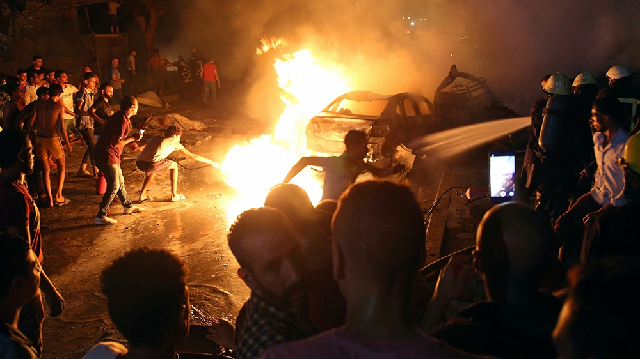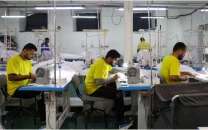Deadly Cairo blast caused by explosives-packed car
20 people killed and 47 sustained injuries

People extinguish the fire caused by the blast outside the National Cancer Institute in Cairo. PHOTO: Reuters
The car was driving against the traffic when it smashed into three other vehicles just before midnight on Sunday evening, setting off a massive explosion just outside the country's National Cancer Institute.
"There were men without heads and people covered in blood making them unrecognisable," said Mohamed Fathy, a witness.
"Some of their heads were burnt on the ground."
Four of the 20 people killed remain unidentified, the health ministry said on Monday, while 47 others were wounded.
Between "three and four (of the injured) are in critical condition in the intensive care unit," Khaled Megahed, a spokesperson for the health ministry, told a press conference.
He said they suffered from burns of varying degrees.
Body parts were retrieved from the scene, he added.
President Abdel Fattah al-Sisi described the blast as a "terrorist incident".
In a social media post, he offered his condolences to the victims' families and the Egyptian people.
Authorities issue alert to villagers living along LoC amid tensions with India
The interior ministry said a technical inspection indicated "an amount of explosives was inside the car, which caused it to explode when it collided."
Another witness, Moham Zaki, said "it was raining rocks and iron - I ran to my daughter to protect her. I saw she was hit by something in her head, was it part of a car?"
A third witness, Mohammed, said "at first we felt pressure, pressure around us and in our ears."
"After a while we heard an explosion, it was extreme - we thought it was an earthquake."
Social media users posted footage of cars ablaze at the scene and of patients being evacuated from the Cancer Institute, which was severely damaged and charred in the explosion.
Megahed said 78 cancer patients from the institute were moved to other hospitals to continue their treatment.
Both the interior ministry and police said they suspected the Hasm group of being behind the attack.
The Hasm group emerged in 2016 and has in the past claimed responsibility for several attacks.
Since then, Egypt has seen a surge in sectarian attacks targeting its Christian minority and security forces.
In February 2018, the army launched a nationwide offensive against militants, focused mainly on North Sinai, where the Islamic State group has a significant presence.
Egypt has just hosted the Africa Cup of Nations football tournament, which involved a massive security operation in Cairo and elsewhere to guard against attacks.
Heavily armed personnel and armoured vehicles took up positions around stadia, and numerous checkpoints filtered the flow of people seeking to enter arenas.



















COMMENTS
Comments are moderated and generally will be posted if they are on-topic and not abusive.
For more information, please see our Comments FAQ